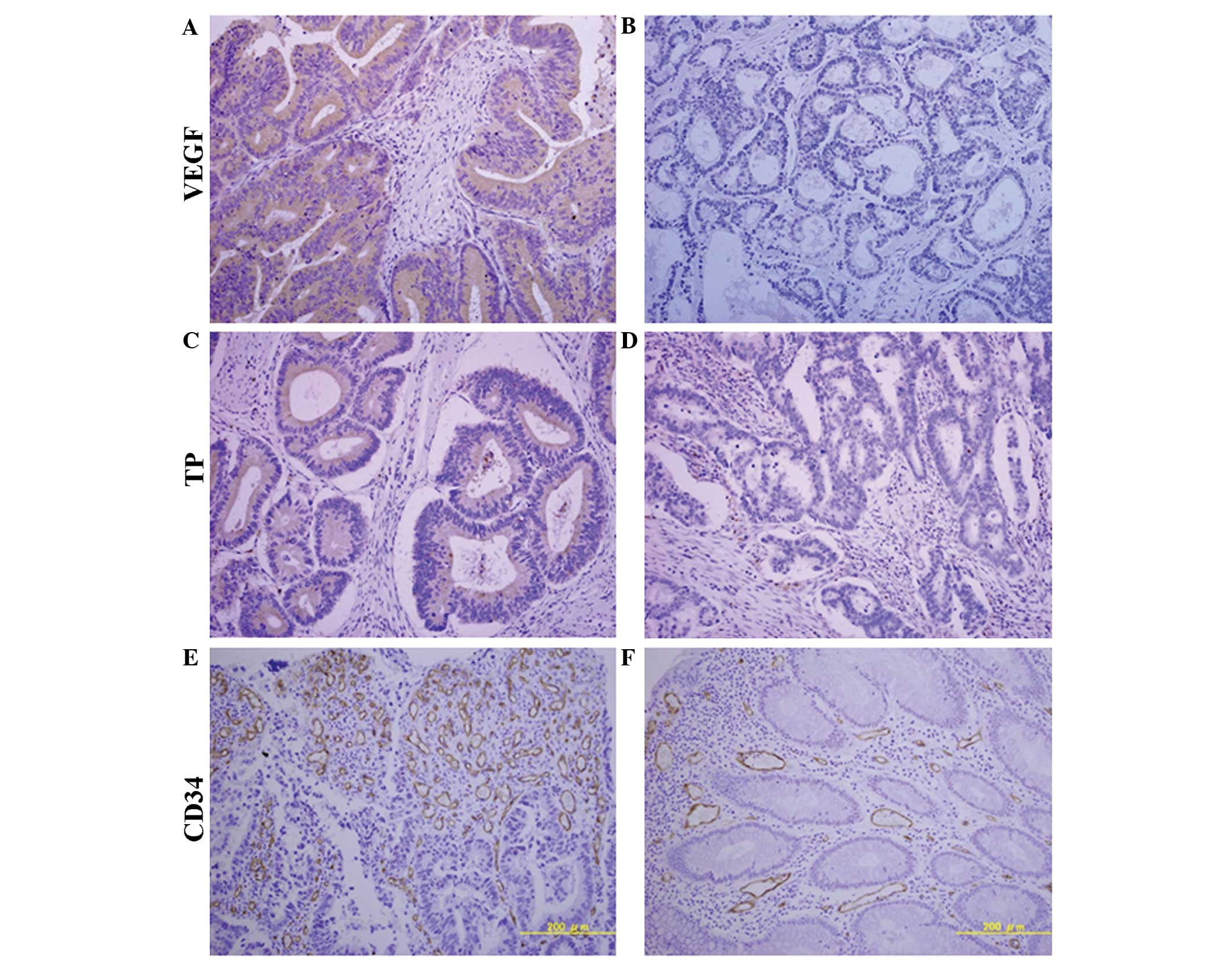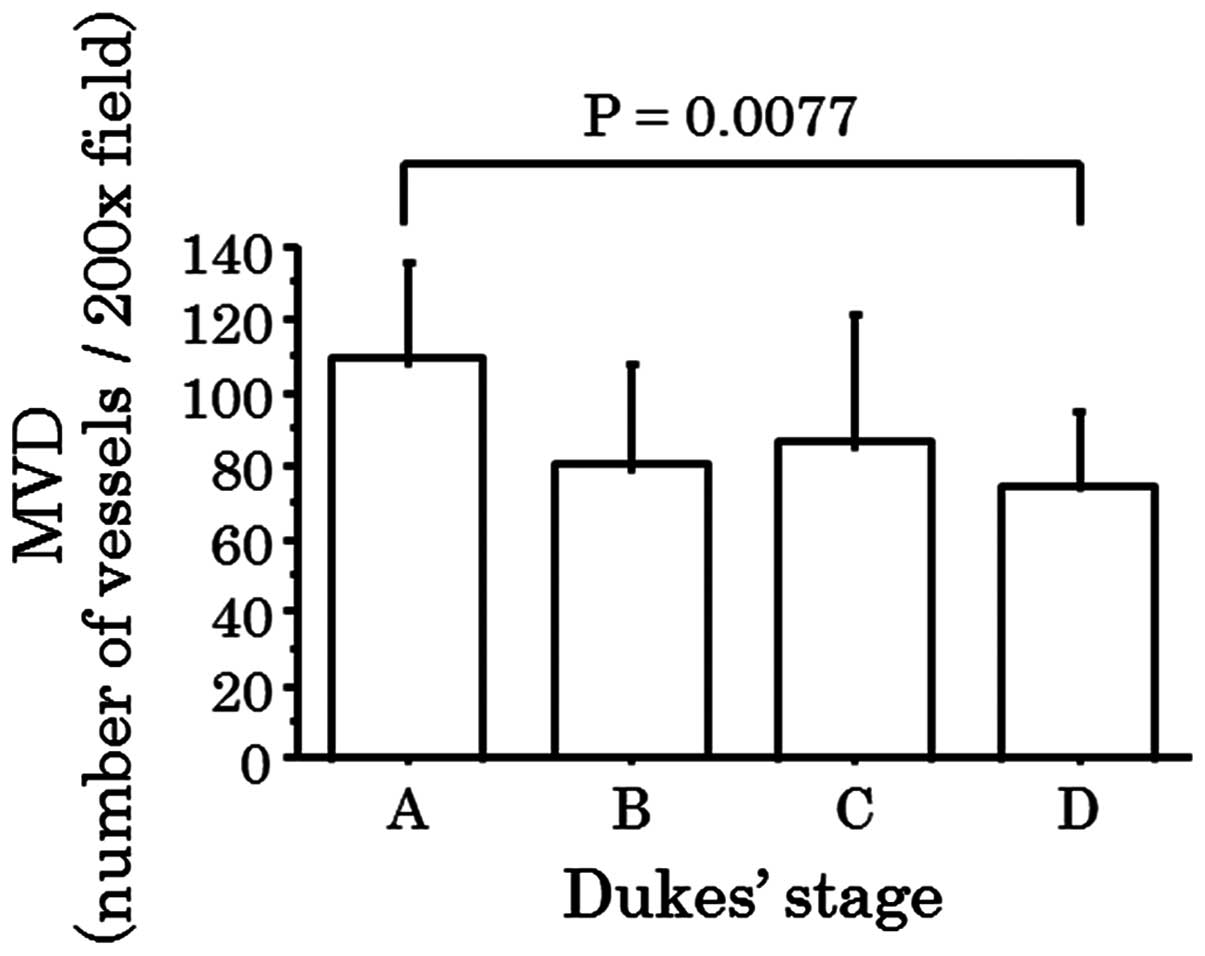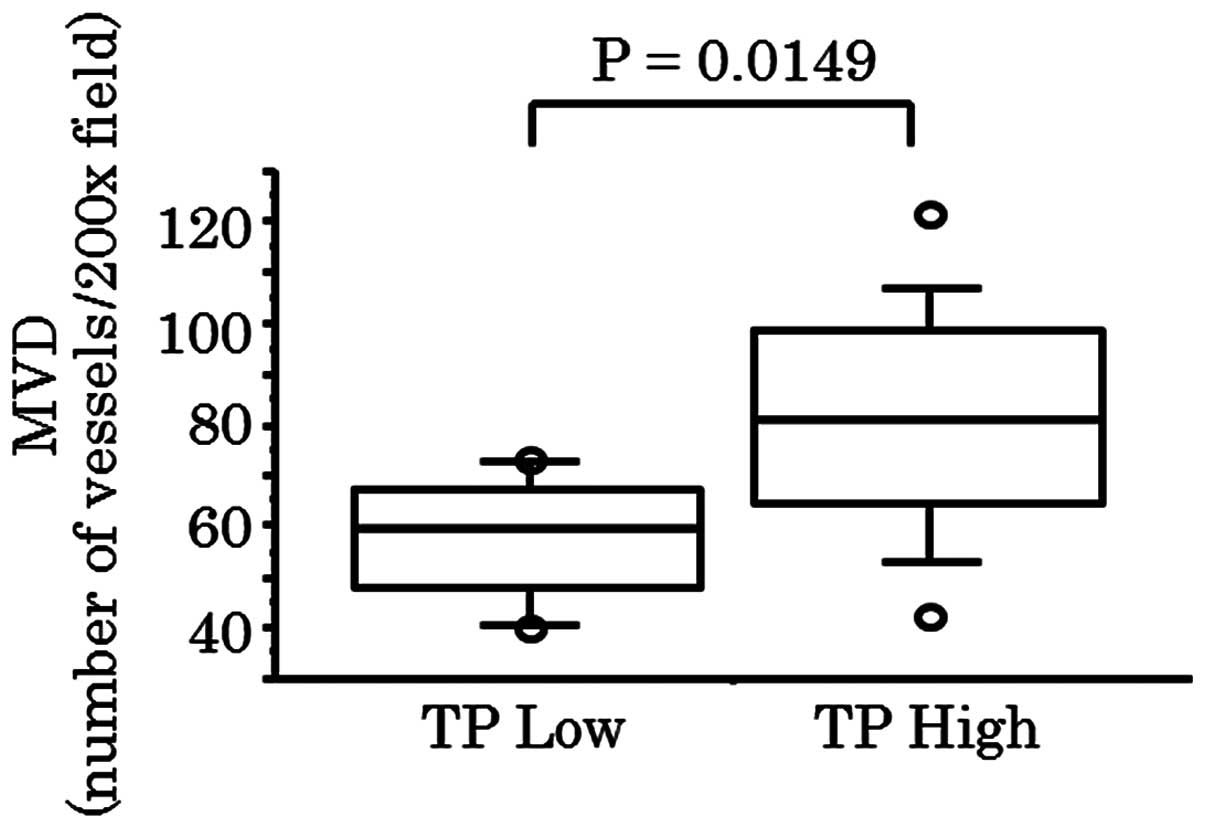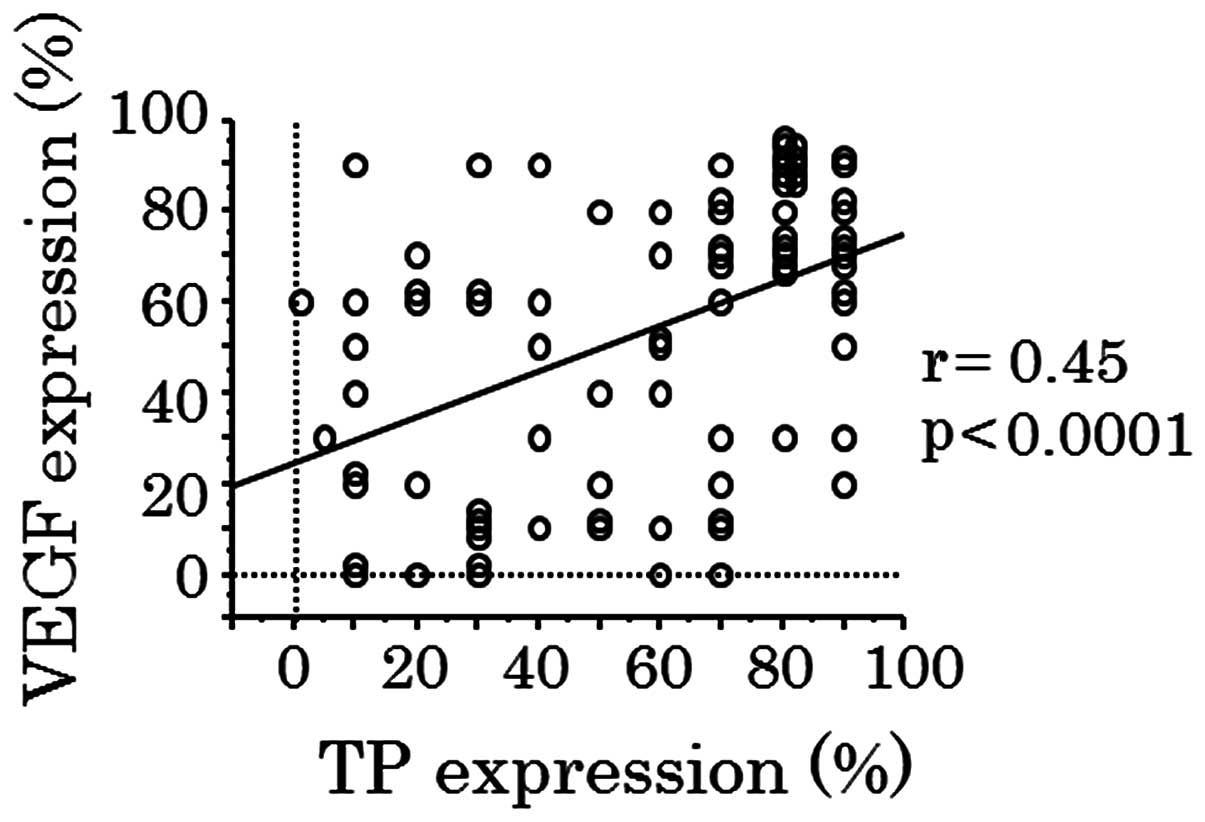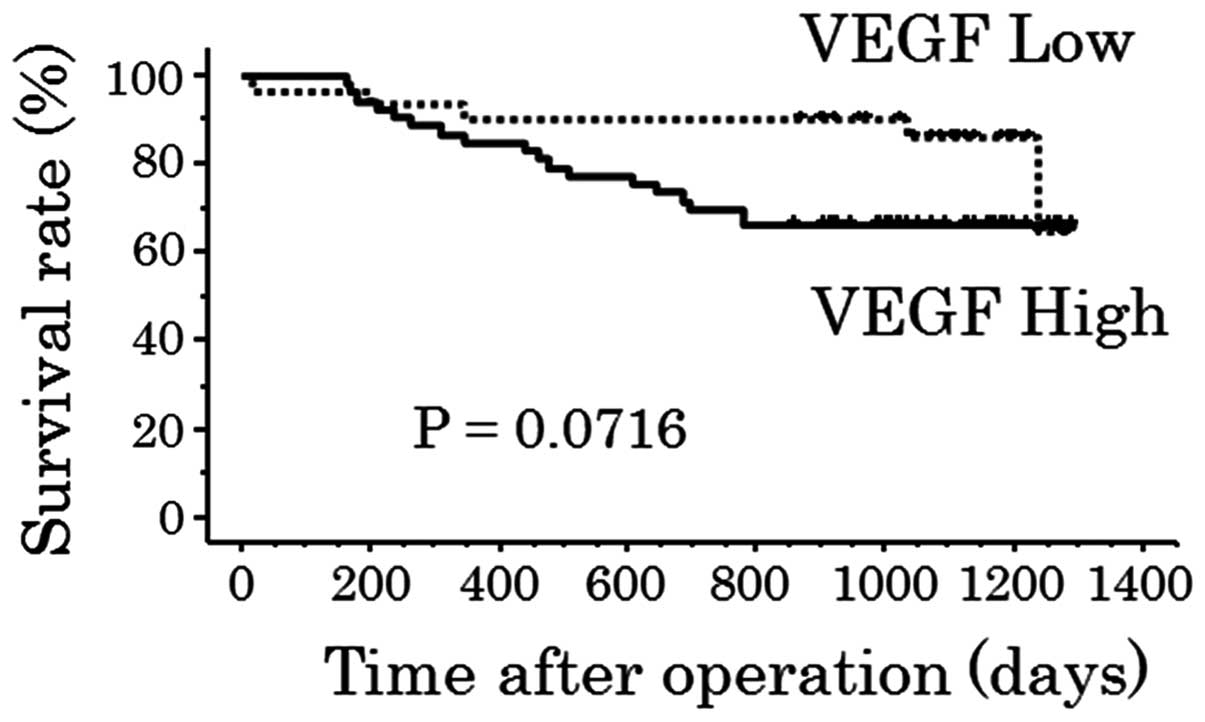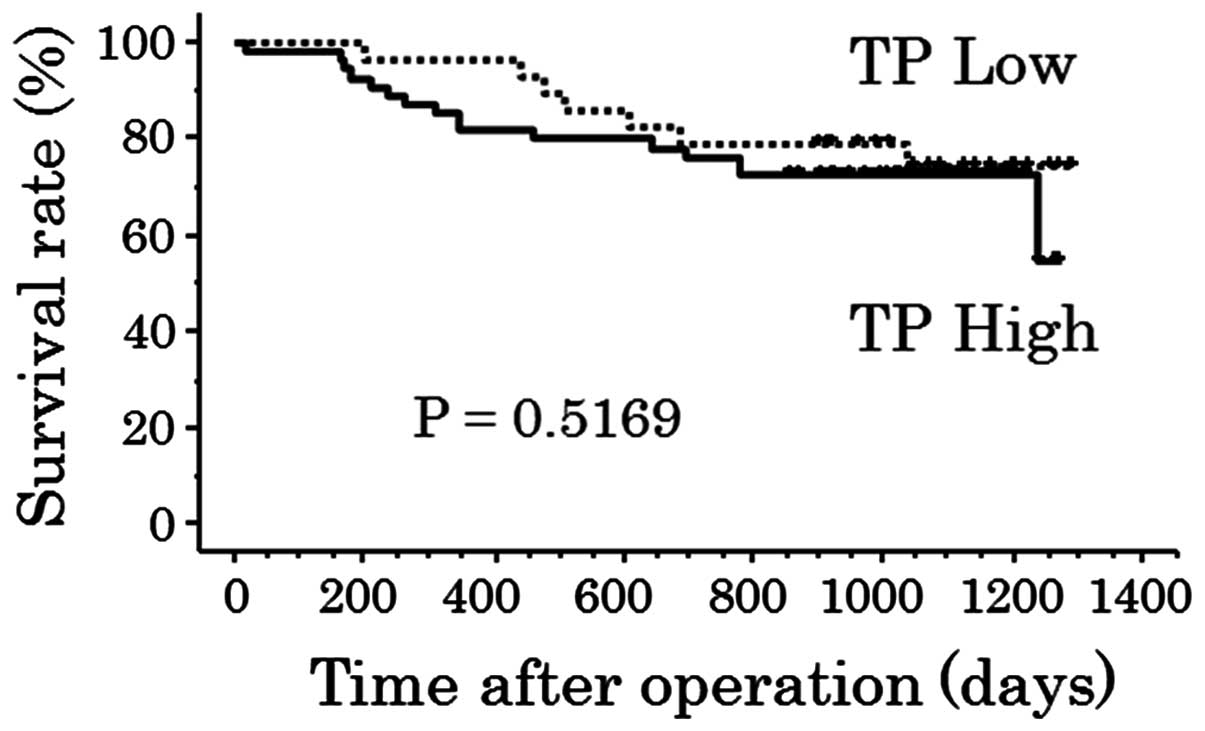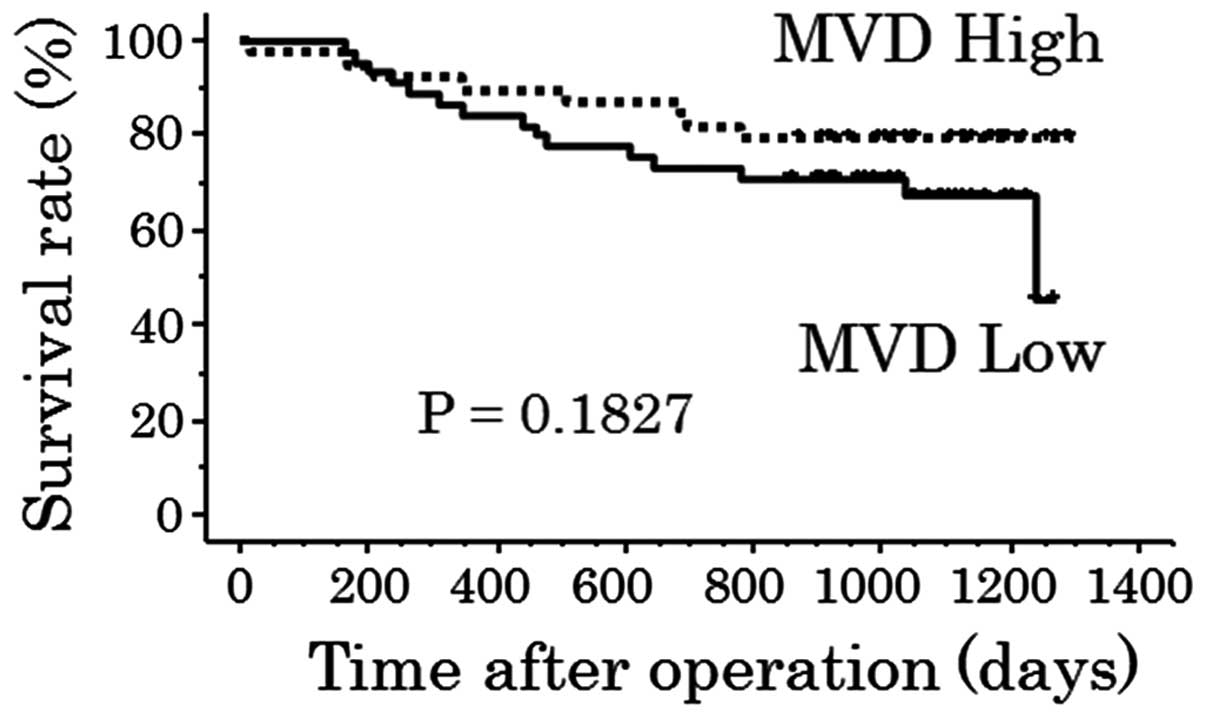|
1
|
Zafirellis K, Agrogiannis G, Zachaki A,
Gravani K, Karameris A and Kombouras C: Prognostic significance of
VEGF expression evaluated by quantitative immunohistochemical
analysis in colorectal cancer. J Surg Res. 147:99–107. 2008.
View Article : Google Scholar
|
|
2
|
Pourhoseingholi MA: Increased burden of
colorectal cancer in Asia. World J Gastrointest Oncol. 4:68–70.
2012. View Article : Google Scholar : PubMed/NCBI
|
|
3
|
Sobin L, Gospodarowicz MK and Wittekind C:
Colon and rectum. TNM Classification of Malignant Tumors. Sobin L,
Gospodarowicz MK and Wittekind C: 7th edition. Wiley-Blackwell; New
York: pp. 100–pp105. 2009
|
|
4
|
Papamichael D: Prognostic role of
angiogenesis in colorectal cancer. Anticancer Res. 21:4349–4353.
2001.
|
|
5
|
Folkman J: What is the evidence that
tumors are angiogenesis dependent? J Natl Cancer Inst. 82:4–6.
1990. View Article : Google Scholar : PubMed/NCBI
|
|
6
|
Folkman J, Watson K, Ingber D and Hanahan
D: Induction of angiogenesis during the transition from hyperplasia
to neoplasia. Nature. 339:58–61. 1989. View
Article : Google Scholar : PubMed/NCBI
|
|
7
|
Des Guetz G, Uzzan B, Nicolas P, Cucherat
M, Morere JF, Benamouzig R, Breau JL and Perret GY: Microvessel
density and VEGF expression are prognostic factors in colorectal
cancer. Meta-analysis of the literature. Br J Cancer. 94:1823–1832.
2006. View Article : Google Scholar : PubMed/NCBI
|
|
8
|
Tanigawa N, Amaya H, Matsumura M, Lu C,
Kitaoka A, Matsuyama K and Muraoka R: Tumor angiogenesis and mode
of metastasis in patients with colorectal cancer. Cancer Res.
57:1043–1046. 1997.PubMed/NCBI
|
|
9
|
Gao J, Knutsen A, Arbman G, Carstensen J,
Frånlund B and Sun XF: Clinical and biological significance of
angiogenesis and lymphan-giogenesis in colorectal cancer. Dig Liver
Dis. 41:116–122. 2009. View Article : Google Scholar
|
|
10
|
Giatromanolaki A, Sivridis E and
Koukourakis MI: Angiogenesis in colorectal cancer: Prognostic and
therapeutic implications. Am J Clin Oncol. 29:408–417. 2006.
View Article : Google Scholar : PubMed/NCBI
|
|
11
|
Amaya H, Tanigawa N, Lu C, Matsumura M,
Shimomatsuya T, Horiuchi T and Muraoka R: Association of vascular
endothelial growth factor expression with tumor angiogenesis,
survival and thymidine phosphorylase/platelet-derived endothelial
cell growth factor expression in human colorectal cancer. Cancer
Lett. 119:227–235. 1997. View Article : Google Scholar
|
|
12
|
Zheng S, Han MY, Xiao ZX, Peng JP and Dong
Q: Clinical significance of vascular endothelial growth factor
expression and neovascularization in colorectal carcinoma. World J
Gastroenterol. 9:1227–1230. 2003. View Article : Google Scholar : PubMed/NCBI
|
|
13
|
Ishigami SI, Arii S, Furutani M, Niwano M,
Harada T, Mizumoto M, Mori A, Onodera H and Imamura M: Predictive
value of vascular endothelial growth factor (VEGF) in metastasis
and prognosis of human colorectal cancer. Br J Cancer.
78:1379–1384. 1998. View Article : Google Scholar : PubMed/NCBI
|
|
14
|
Cascinu S, Staccioli MP, Gasparini G,
Giordani P, Catalano V, Ghiselli R, Rossi C, Baldelli AM, Graziano
F, Saba V, et al: Expression of vascular endothelial growth factor
can predict event-free survival in stage II colon cancer. Clin
Cancer Res. 6:2803–2807. 2000.PubMed/NCBI
|
|
15
|
Furukawa T, Yoshimura A, Sumizawa T,
Haraguchi M, Akiyama S, Fukui K, Ishizawa M and Yamada Y:
Angiogenic factor. Nature. 356(668)1992. View Article : Google Scholar : PubMed/NCBI
|
|
16
|
Ishikawa F, Miyazono K, Hellman U, Drexler
H, Wernstedt C, Hagiwara K, Usuki K, Takaku F, Risau W and Heldin
CH: Identification of angiogenic activity and the cloning and
expression of platelet-derived endothelial cell growth factor.
Nature. 338:557–562. 1989. View
Article : Google Scholar : PubMed/NCBI
|
|
17
|
Ciccolini J, Evrard A and Cuq P: Thymidine
phosphorylase and fluoropyrimidines efficacy: A Jekyll and Hyde
story. Curr Med Chem Anticancer Agents. 4:71–81. 2004. View Article : Google Scholar : PubMed/NCBI
|
|
18
|
Folkman J: What is the role of thymidine
phosphorylase in tumor angiogenesis. J Natl Cancer Inst.
88:1091–1092. 1996. View Article : Google Scholar : PubMed/NCBI
|
|
19
|
Takebayashi Y, Akiyama S, Akiba S, Yamada
K, Miyadera K, Sumizawa T, Yamada Y, Murata F and Aikou T:
Clinicopathologic and prognostic significance of an angiogenic
factor, thymidine phosphorylase, in human colorectal carcinoma. J
Natl Cancer Inst. 88:1110–1117. 1996. View Article : Google Scholar : PubMed/NCBI
|
|
20
|
Takahashi Y, Bucana CD, Liu W, Yoneda J,
Kitadai Y, Cleary KR and Ellis LM: Platelet-derived endothelial
cell growth factor in human colon cancer angiogenesis: Role of
infiltrating cells. J Natl Cancer Inst. 88:1146–1151. 1996.
View Article : Google Scholar : PubMed/NCBI
|
|
21
|
Matsuura T, Kuratate I, Teramachi K, Osaki
M, Fukuda Y and Ito H: Thymidine phosphorylase expression is
associated with both increase of intratumoral microvessels and
decrease of apoptosis in human colorectal carcinomas. Cancer Res.
59:5037–5040. 1999.PubMed/NCBI
|
|
22
|
Saito S, Tsuno N, Nagawa H, Sunami E,
Zhengxi J, Osada T, Kitayama J, Shibata Y, Tsuruo T and Muto T:
Expression of platelet-derived endothelial cell growth factor
correlates with good prognosis in patients with colorectal
carcinoma. Cancer. 88:42–49. 2000. View Article : Google Scholar : PubMed/NCBI
|
|
23
|
van Triest B, Pinedo HM, Blaauwgeers JL,
van Diest PJ, Schoenmakers PS, Voorn DA, Smid K, Hoekman K, Hoitsma
HF and Peters GJ: Prognostic role of thymidylate synthase,
thymidine phosphorylase/platelet-derived endothelial cell growth
factor and proliferation markers in colorectal cancer. Clin Cancer
Res. 6:1063–1072. 2000.PubMed/NCBI
|
|
24
|
van Halteren HK, Peters HM, van Krieken
JH, Coebergh JW, Roumen RM, van der Worp E, Wagener JT and
Vreugdenhil G: Tumor growth pattern and thymidine phosphorylase
expression are related with the risk of hematogenous metastasis in
patients with Astler Coller B1/B2 colorectal carcinoma. Cancer.
91:1752–1757. 2001. View Article : Google Scholar : PubMed/NCBI
|
|
25
|
Locker GY, Hamilton S, Harris J, Jessup
JM, Kemeny N, Macdonald JS, Somerfield MR, Hayes DF and Bast RC Jr:
ASCO 2006 update of recommendations for the use of tumor markers in
gastrointestinal cancer. J Clin Oncol. 24:5313–5327. 2006.
View Article : Google Scholar : PubMed/NCBI
|
|
26
|
Mainprize KS, Mortensen NJ and Warren BF:
Dukes' staging is poorly understood by doctors managing colorectal
cancer. Ann R Coll Surg Engl. 84:23–25. 2002.PubMed/NCBI
|
|
27
|
General Assembly of the World Medical
Association; World medical association declaration of Helsinki:
Ethical principles for medical research involving human subjects. J
Am Coll Dent. 81:14–18. 2014.
|
|
28
|
Japanese Society for Cancer of the Colon
and Rectum: Japanese classification of colorectal carcinoma. Second
English Edition. Kanehara & Co., Lit; Tokyo: 2009
|
|
29
|
Ueno H, Murphy J, Jass JR, Mochizuki H and
Talbot IC: Tumour 'budding' as an index to estimate the potential
of aggressiveness in rectal cancer. Histopathology. 40:127–132.
2002. View Article : Google Scholar : PubMed/NCBI
|
|
30
|
Bosari S, Lee AK, DeLellis RA, Wiley BD,
Heatley GJ and Silverman ML: Microvessel quantitation and prognosis
in invasive breast carcinoma. Hum Pathol. 23:755–761. 1992.
View Article : Google Scholar : PubMed/NCBI
|
|
31
|
O'Byrne KJ, Koukourakis MI, Giatromanolaki
A, Cox G, Turley H, Steward WP, Gatter K and Harris AL: Vascular
endothelial growth factor, platelet-derived endothelial cell growth
factor and angiogenesis in non-small-cell lung cancer. Br J Cancer.
82:1427–1432. 2000. View Article : Google Scholar : PubMed/NCBI
|
|
32
|
Takahashi Y, Tucker SL, Kitadai Y, Koura
AN, Bucana CD, Cleary KR and Ellis LM: Vessel counts and expression
of vascular endothelial growth factor as prognostic factors in
node-negative colon cancer. Arch Surg. 132:541–546. 1997.
View Article : Google Scholar : PubMed/NCBI
|
|
33
|
Ogata Y, Matono K, Mizobe T, Ishibashi N,
Mori S, Akagi Y, Ikeda S, Ozasa H, Murakami H and Shirouzu K: The
expression of vascular endothelial growth factor determines the
efficacy of post-operative adjuvant chemotherapy using oral
fluoropyrimidines in stage II or III colorectal cancer. Oncol Rep.
15:1111–1116. 2006.PubMed/NCBI
|
|
34
|
George ML, Tutton MG, Janssen F, Arnaout
A, Abulafi AM, Eccles SA and Swift RI: VEGF-A, VEGF-C and VEGF-D in
colorectal cancer progression. Neoplasia. 3:420–427. 2001.
View Article : Google Scholar : PubMed/NCBI
|
|
35
|
Yoshimoto K, Kawahara H, Kobayashi S,
Kashiwagi H, Hirai K and Yanaga K: Importance of thymidine
phosphorylase expression at the invasive front of T3 rectal cancer
as a prognostic factor. Dig Surg. 23:331–335. 2006. View Article : Google Scholar : PubMed/NCBI
|
|
36
|
Abdou AG, Aiad H, Asaad N, Abd El-Wahed M
and Serag El-Dien M: Immunohistochemical evaluation of vascular
endothelial growth factor (VEGF) in colorectal carcinoma. J Egypt
Natl Canc Inst. 18:311–322. 2006.
|
|
37
|
Aoki T, Katsumata K, Tsuchida A, Tomioka H
and Koyanagi Y: Correlation between malignancy grade and p53 gene
in relation to thymidine phosphorylase activity in colorectal
cancer patients. Oncol Rep. 9:1267–1271. 2002.PubMed/NCBI
|
|
38
|
Tsuji T, Sawai T, Yamashita H, Takeshita
H, Nakagoe T, Shindou H, Fukuoka H, Yoshinaga M, Hidaka S, Yasutake
T, et al: Platelet-derived endothelial cell growth factor
expression is an independent prognostic factor in colorectal cancer
patients after curative surgery. Eur J Surg Oncol. 30:296–302.
2004. View Article : Google Scholar : PubMed/NCBI
|
|
39
|
Matsumura M, Chiba Y, Lu C, Amaya H,
Shimomatsuya T, Horiuchi T, Muraoka R and Tanigawa N:
Platelet-derived endothelial cell growth factor/thymidine
phosphorylase expression correlated with tumor angiogenesis and
macrophage infiltration in colorectal cancer. Cancer Lett.
128:55–63. 1998. View Article : Google Scholar : PubMed/NCBI
|
|
40
|
Osanai T, Ichikawa W, Takagi Y, Uetake H,
Nihei Z and Sugihara K: Expression of pyrimidine nucleoside
phosphorylase (PyNPase) in colorectal cancer. Jpn J Clin Oncol.
31:500–505. 2001. View Article : Google Scholar : PubMed/NCBI
|
|
41
|
Tokunaga Y, Hosogi H, Hoppou T, Nakagami
M, Tokuka A and Ohsumi K: Prognostic value of thymidine
phosphorylase/platelet-derived endothelial cell growth factor in
advanced colorectal cancer after surgery: Evaluation with a new
monoclonal antibody. Surgery. 131:541–547. 2002. View Article : Google Scholar : PubMed/NCBI
|
|
42
|
Takebayashi Y, Aklyama S, Yamada K, Akiba
S and Aikou T: Angiogenesis as an unfavorable prognostic factor in
human colorectal carcinoma. Cancer. 78:226–231. 1996. View Article : Google Scholar : PubMed/NCBI
|
|
43
|
Cianchi F, Palomba A, Messerini L, Boddi
V, Asirelli G, Perigli G, Bechi P, Taddei A, Pucciani F and
Cortesini C: Tumor angiogenesis in lymph node-negative rectal
cancer: Correlation with clinicopathological parameters and
prognosis. Ann Surg Oncol. 9:20–26. 2002. View Article : Google Scholar : PubMed/NCBI
|
|
44
|
Nakayama Y, Nagashima N, Minagawa N, Inoue
Y, Katsuki T, Onitsuka K, Sako T, Hirata K, Nagata N and Itoh H:
Relationships between tumor-associated macrophages and
clinicopathological factors in patients with colorectal cancer.
Anticancer Res. 22:4291–4296. 2002.
|
|
45
|
Rajaganeshan R, Prasad R, Guillou PJ,
Chalmers CR, Scott N, Sarkar R, Poston G and Jayne DG: The
influence of invasive growth pattern and microvessel density on
prognosis in colorectal cancer and colorectal liver metastases. Br
J Cancer. 96:1112–1117. 2007. View Article : Google Scholar : PubMed/NCBI
|
|
46
|
Kaneko I, Tanaka S, Oka S, Yoshida S,
Hiyama T, Arihiro K, Shimamoto F and Chayama K: Immunohistochemical
molecular markers as predictors of curability of endoscopically
resected submucosal colorectal cancer. World J Gastroenterol.
13:3829–3835. 2007. View Article : Google Scholar : PubMed/NCBI
|
|
47
|
Yan G, Zhou XY, Cai SJ, Zhang GH, Peng JJ
and Du X: Lymphangiogenic and angiogenic microvessel density in
human primary sporadic colorectal carcinoma. World J Gastroenterol.
14:101–107. 2008. View Article : Google Scholar : PubMed/NCBI
|















